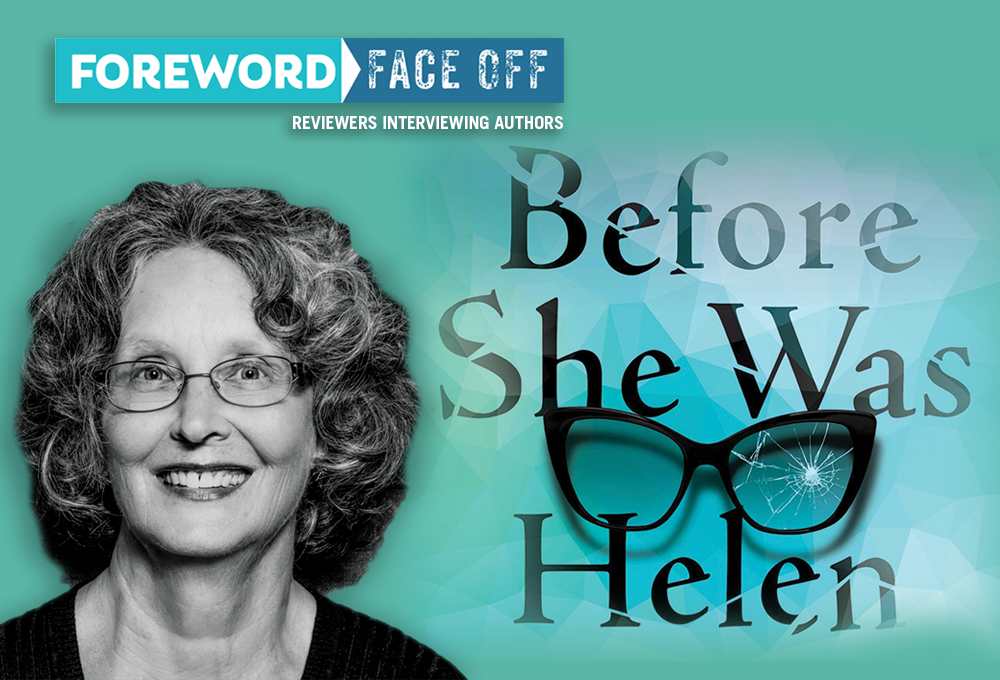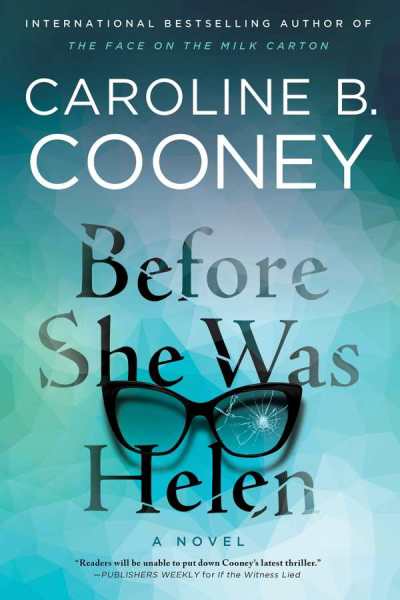Reviewer Michelle Anne Schingler Interviews Caroline B. Cooney, Author of Before She Was Helen


No intro required to welcome Caroline B. Cooney into the Foreword This Week fold. We’ll just mention her enthralling new thriller, Before She Was Helen, chalked up a stellar review by Managing Editor Michelle Anne Schingler in the pages of Foreword Reviews, and the thought of pairing the two of them for a feisty conversation was too tempting to resist. Michelle, as it turns out, goes way, way back with some of Caroline’s earliest YA work. She’s a true fan.
Michelle, when your hands stop shaking, you may begin.
The culprits, technical victims, accidental accomplices, and heroine of your novel take on ageism with humor and heart. What is Before She Was Helen’s takeaway for those who underestimate folks of age?
I’ve never met anybody who felt old. Every woman my age feels the same as she ever did. We’re all wearing great disguises, though. The grey hair, extra pounds, and sagging chin aren’t visible from the inside, where we are the same girl we used to be. I write entertainment and I’m not teaching lessons. But it would be cool if my younger readers (i.e., under 70!) realize that age has nothing to do with it. We’re just as interesting as we ever were.
Coach Creek’s predatory behavior is revealed, and develops, in a harrowing way; those portions of the novel practically require locked-door, sunshine-outside reading. Why do you think that villains such as he loom so large in our imaginations?
My childhood was sunny. My brother and I often comment that we have no bad childhood stories to tell. So in this book (and in dozens of other books I’ve written) every single thing is fiction. But my heart breaks for those who have truly suffered, and this is my attempt to show what some of that suffering might be.
Is it wrong that my response to Coach Creek’s eventual end was glee? How do you hope your readers will respond to his vanquishment?
This is a mystery novel, and most mysteries kill somebody off. In fact, if you find yourself reading a mystery without a body, where’s the fun? Coach definitely needed killing and building up to that moment was a rather enjoyable challenge. What matters in the end, though, is the ambiguity. Exactly who is guilty of that killing? No matter the evil of the man who stalked and attacked her, Clemmie will carry forever the guilt of killing him, even though she didn’t strike a blow herself.
Clementine is assaulted in the 1950s, which you make clear was a time when no one took rape seriously, and when girls who got pregnant because of rape, or even because of sexual expressions that were their choices, were considered wayward. Your novel takes great pains to distinguish the world as it was, in these senses, from the way that it is now. This considered: what would Clemmie have to say about the #MeToo movement?
If Clemmie were able to remake part of her world, I suspect it would be to keep the love and respect of her parents. It was almost another form of rape to have her parents’ love ripped away. Clemmie was left with more than one hole in her heart. She would be glad that it is easier now to speak up. But what she would really want is to have her parents not think that that rape had been her own fault.
Boro, like Coach Creek, makes the mistake of underestimating tiny, pretty Clemmie; still, he gets off fairly easy, given the trouble he stirs up. For those of us who were so consumed with cheering for Coach Creek’s fateful meeting that we may have missed it: Whatever happened to Boro?
Boro is in a car that gets caught in traffic. The unwilling driver—a hero on a very low scale—simply gets out of the car and abandons him. Since that driver is covered in blood, I expect my reader will assume that cell phones in three or four lanes of stopped cars will be calling the police and that Boro will be rounded up. But I don’t actually write this. I have a tendency to have somewhat open endings (Face on the Milk Carton, for example) so this is no surprise to long term readers.
The book’s end teases Billy learning about his biological parents. Are you planning a follow-up and, if so, would it be more Helen and Billy reunite, or more Billy deals with learning the terrible truth about his biological father?
I am in fact working on another Clemmie mystery. Its plot has nothing to do with the people and problems of the first book, although Clemmie is living in the same house in the same Sun City. There is a different kind of threat to Clemmie’s stolen identity, which therefore becomes a threat to her beloved (though virtually unknown) adult son, Billy. As for having Clemmie and Billy actually meet, that would end the suspense; the story would be over. Were I to have them meet, it would be many books away, because I love writing about Clemmie.
I have such fond memories of your Janie books from my childhood. Between Janie and Helen, there are connections—most notably, that both Billy and Janie are raised in found families—but your adult novels are also very different from your YA ones. I would argue that Janie readers should absolutely pick up Before She Was Helen, but what would you like to say to woo fellow earlier readers over?
The big question young adults ask themselves is, “Who am I?” In The Face on the Milk Carton, Janie is the ultimate “Who am I?” story. Nobody really knows, and there are conflicting versions and sets of families. I love this theme—after all, I wrote five Janie books! You are absolutely right about Before She Was Helen. It’s the reverse story: the last thing Clemmie wants anybody to ask is, “Who are you?”
What are you working on next?
My next mystery is Trapping Freddy. It will be out in 2021 with Sourcebooks. It is not a Clemmie book. It’s about a young man who can’t seem to straighten out his life, his dearly beloved grandmother who can’t seem to remember hers, and the shadowy threat that hangs over them both.
Michelle Anne Schingler
